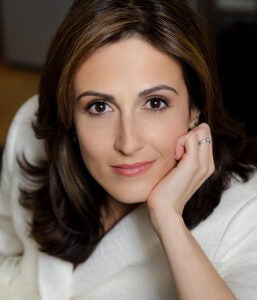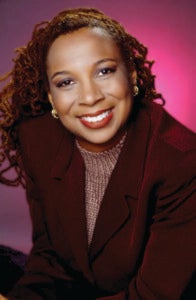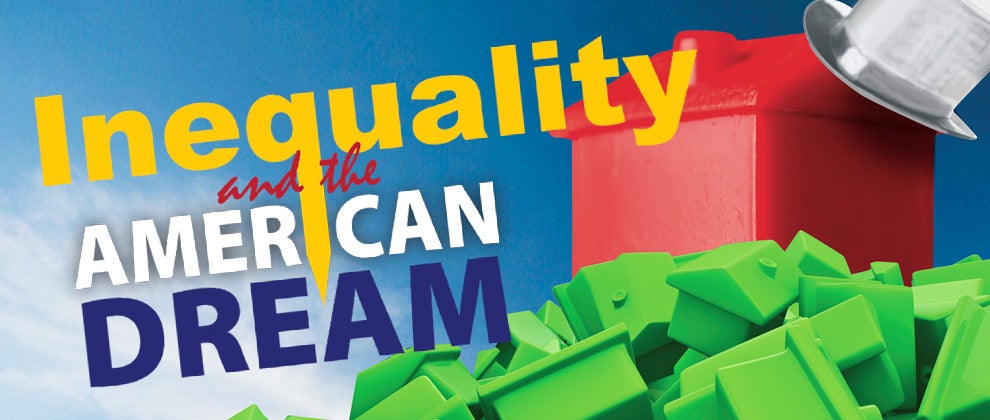KINGSTON, R.I. – September 8, 2016 – University of Rhode Island Assistant Professor of Economics Liam Malloy puts it simply: Income inequality today is where it stood in the 1920s right before the Great Depression.
His colleague, URI Associate Professor of Political Science Kristin Johnson, has been at URI for nine years and when she asked her students in the early part of her career what they had hoped to earn after graduation, they said around $80,000. “Now they are saying $30,000, and ‘I just want to survive. I just want a job’,” Johnson said.
And most Americans know the squeezing of the American middle class, those living in poverty and immigration have been among the hottest topics in the presidential campaign. In fact, on Labor Day, 2016, former presidential candidate Bernie Sanders offered this tweet: “This is truly unbelievable. The U.S. middle class has a lower share of wealth than China, India and Brazil.”
The University’s 2016 Honors Colloquium will address the many interrelated issues of economic, political and social inequality this fall as it presents “Inequality and the American Dream.” URI’s premier free, public lecture series meets Tuesdays from Sept. 20 to Nov. 29 at 7 p.m. in Edwards Hall, 64 Upper College Road on the Kingston Campus. The topics of the nine lectures are: Immigration; Race, Diversity and Education; Historical Perspectives; Poverty and Homelessness; Gender; Workplace; Politics; Labor; and What is to be Done About Inequality? The speakers include political scientists, media pundits, historians, constitutional experts, nationally known journalists and union experts.
In addition to the lectures, there will be a special showing of the movie, Wall Street, on Sept. 13 and the URI Theatre Department will present the play “Good People,” in October in conjunction with the colloquium. The play examines the travails of a single mother of a child with disabilities who is fired from her Dollar Store job. For a full schedule of events, go to uri.edu/hc.
This year’s colloquium is the work of coordinators Jill Doerner, associate professor of sociology; Erik Loomis, assistant professor of history, Johnson and Malloy.
In their proposal to Lynne Derbyshire, director of the Honors Program and the URI Honors Program Committee , the four professors raise the question, “Is the American economic engine broken? For a majority of families and the current generation of college students, the answer may be, yes. Worker productivity has more than doubled since the late 1970s, but compensation has hardly risen at all for the median worker. In the United States, the share of income going to the top 1 percent has more than doubled, while the share going to the top .01 percent, about 15,000 households, has increased eightfold.”
Malloy said that increasing inequality has affected much of American life, including the political arena, in which millionaires and billionaires are free to spend as much as they want, narrowing of agendas and crowding out competing political voices.
“A very real consequence is social and economic policy geared toward their interests,” Malloy said.
“For much of our history, the concept of the American Dream told us that if you worked hard, you could get a good job, buy a home and have a solid economic future,” Johnson said. “We are now less confident about that.”
Doerner said even the promise of a college degree leading to a better future is eroding. “A college degree is no longer providing what has been expected in the past,” she said. “We had everything we needed when I was a kid, even though my parents lived paycheck to paycheck. Now, I make twice what my parents made and often find it difficult to pay all the bills.”
Loomis said, “The issue of inequality is one of the greatest problems in the United States today, with large-scale implications on our society and politics. We hope to raise awareness among the URI community and the people of Rhode Island about the many facets of this inequality and to think together about how to combat these problems.”

The series starts Tuesday, Sept. 20 with a talk on Immigration by Victoria M. DeFrancesco Soto, a political analyst and professor at the University of Texas at Austin. She provides political analysis on U.S. politics and its implications for countries abroad. DeFrancesco Soto is a contributor to MSNBC and NBCNews.com, as well as a regular political analyst for Telemundo. She has previously provided on-air analysis for CNN, Fox, PBS, Univision, NPR and has appeared on HBO’s Real Time with Bill Maher.
She earned her Ph.D. at Duke University, during which time she was a National Science Foundation Fellow. At the University of Texas she was selected as one of the University’s Game Changing faculty. Victoria teaches in the Department of Mexican-American and Latino Studies and is a Fellow at the Center for Politics and Governance at the LBJ School of Public Affairs. Named one of the top 12 scholars in the country by Diverse magazine she previously taught at Northwestern University and Rutgers.

The second lecture on Sept. 27 features the Diversity Week Keynote Speaker, Kimberlé Crenshaw, professor of law at the University of California Los Angeles and Columbia University. Her topic is “Race, Diversity and Education.” Her primary scholarly interests center around race and the law, and she was a founder and has been a leader in the intellectual movement called Critical Race Theory. She was elected Professor of the Year by the 1991 and 1994 graduating classes at UCLA. She now splits her time each year between UCLA and the Columbia School of Law.
Major Sponsor of the Colloquium
URI Honors Program
Sponsors
URI Office of the President • URI Office of the Provost • The Mark and Donna Ross Honors Colloquium Humanities Endowment • The Thomas Silvia and Shannon Chandley Honors Colloquium Endowment • URI College of Arts & Sciences • URI College of Pharmacy • URI John Hazen White Sr. Center for Ethics and Public Service • URI Gender and Women’s Studies Program • URI Multicultural Student Services Center • URI Theatre Department • URI College of Engineering • URI College of the Environment and Life Sciences • URI College of Health Sciences • URI College of Business Administration • URI College of Nursing • URI Division of Student Affairs • URI Department of Communications and Marketing • URI Department of Publications and Creative Services • URI ITS Instructional Technology and Media Services • URI Feinstein College of Education and Professional Studies • URI Charles T. Schmidt, Jr. Labor Research Center

